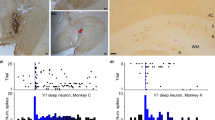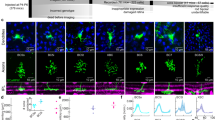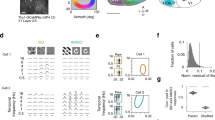Abstract
In the feline visual system, neurons exhibiting sensitivity to the length of a moving contour were first observed in the cortex1,2 and described as 'hypercomplex' cells'. In these cells an increase in stimulus length beyond an optimal value leads to a rapid decline in response. This decline has been attributed to an intracortical inhibitory input1 which may be driven by layer VI cells with very long receptive fields3. It is now clear, however, that cells in the dorsal lateral geniculate nucleus (dLGN), exhibit a degree of length tuning similar to that of cortical 'hypercomplex cells'4,5, suggesting that this response property could be generated subcortically. Alternatively, as the dLGN receives a massive corticofugal projection from layer VI cells in the visual cortex6, it is possible that this input has a function in generating length tuning in the dLGN. We have investigated this issue by comparing the length tuning of dLGN cells with and without corticofugal feedback. The data show that corticofugal feedback makes a highly significant contribution to the length tuning of dLGN cells. This raises the possibility that length tuning is an emergent property of the geniculo-cortical loop.
This is a preview of subscription content, access via your institution
Access options
Subscribe to this journal
Receive 51 print issues and online access
$199.00 per year
only $3.90 per issue
Buy this article
- Purchase on SpringerLink
- Instant access to full article PDF
Prices may be subject to local taxes which are calculated during checkout
Similar content being viewed by others
References
Hubel, D. H. & Wiesel, T. N. J. Neurophysiol. 28, 229–289 (1965).
Hubel, D. H. & Wiesel, T. N. J. Physiol., Lond. 195, 215–243 (1968).
Boiz, J. & Gilbert, C. D. Nature 320, 362–365 (1986).
Cleland, B. G., Lee, B. B. & Vidyasagar, T. R. J. Neurosci. 3, 108–116 (1983).
Jones, H. C. & Sillito, A. M. J. Physiol., Lond. 390, 32P (1987).
Gilbert, C. D. & Kelly, J. P. J. comp. Neurol. 163, 81–106 (1975).
Sillito, A. M. & Kemp, J. A. Brain Res. 277, 63–77 (1983).
Enroth-Cugell, C. & Robson, J. G. J. Physiol., Lond. 197, 517–552 (1966).
So, Y. T. & Shapley, R. M. Expl Brain Res. 36, 533–550 (1979).
Gilbert, C. D. J. Physiol., Lond. 268, 391–421 (1977).
Hubel, D. H. & Wiesel, T. N. J. Physiol., Lond. 160, 106–154 (1962).
Tsumoto, T., Creutzfeldt, O. D. & Legendy, C. R. Expl Brain Res. 32, 345–364 (1978).
Geisert, E. E., Langsetmo, A. & Spear, P. D. Brain Res. 208, 409–415 (1981).
McClurkin, J. W. & Marrocco, R. T. J. Physiol., Lond. 348, 135–152 (1984).
Sillito, A. M. & Versiani, V. J. Physiol., Lond. 273, 775–790 (1977).
Author information
Authors and Affiliations
Rights and permissions
About this article
Cite this article
Murphy, P., Sillito, A. Corticofugal feedback influences the generation of length tuning in the visual pathway. Nature 329, 727–729 (1987). https://doi.org/10.1038/329727a0
Received:
Accepted:
Issue Date:
DOI: https://doi.org/10.1038/329727a0
This article is cited by
-
Corticothalamic feedback sculpts visual spatial integration in mouse thalamus
Nature Neuroscience (2021)
-
Shaping somatosensory responses in awake rats: cortical modulation of thalamic neurons
Brain Structure and Function (2018)
-
Meta-adaptation in the auditory midbrain under cortical influence
Nature Communications (2016)
-
Development of spatial coarse-to-fine processing in the visual pathway
Journal of Computational Neuroscience (2014)
-
A neural circuit for spatial summation in visual cortex
Nature (2012)



